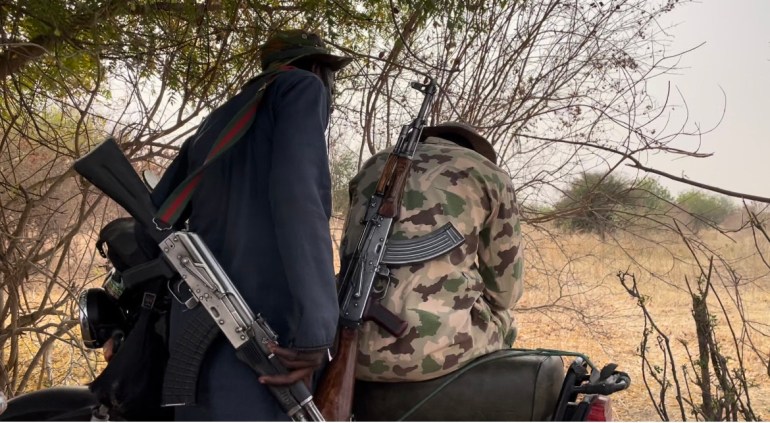Anka, Nigeria – On December 11, 2020, more than 300 boys were abducted from a boarding school in Kankara, a small community in the northwestern Nigerian state of Katsina by gunmen on motorcycles.
The incident fit Boko Haram’s modus operandi, and the group’s leader Abubakar Shekau claimed responsibility for the attack in an audio message, before releasing a video of the kidnapped children.
This further lent credence to the assumption by Nigerian politicians and pundits that the group which has waged war in the northeast for more than a decade, was the orchestrator of the brazen attack.
Within a month, the victims were released.
But in March 2021, Auwalun Daudawa, a notorious kingpin of one of the gangs responsible for abduction sprees in the northwest, claimed responsibility for Kankara. “I did that in Katsina because the governor [Aminu Masari] came out to say he will not dialogue again with our people,” he told the local Daily Trust newspaper.
According to local media reports, the abduction had been a joint operation by seven different gangs who had sent a video to Shekau asking him to claim responsibility. They knew that the government “feared Boko Haram more than them” and would be willing to meet the demands quickly.
The plan worked. According to the schoolboys, an unspecified amount was paid as ransom within days, even though the government repeatedly denied this.
Mislabelling and underestimation
Since 2010, gangs of bandits have run riot in vast swaths of northwest Nigeria but only in the last few years has the crisis ballooned into national prominence in Africa’s most populous country.
Data from the Armed Conflict Location & Event Data Project (ACLED) shows that bandits were responsible for more than 2,600 civilian deaths in 2021 – a lot more than those attributed to Boko Haram and the Islamic State West Africa Province (ISWAP) in the same year – and almost three times the number in 2020.
But debate has been raging on many details about the bandits, including their capacity to shock the state and whether they were petty criminals or more advanced gangsters. In January 2022, the government proscribed them as “terrorists”.
On March 28, an unknown number of heavily armed men attacked a moving train between Nigeria’s capital Abuja and neighbouring Kaduna state. They detonated an explosive device to stop the train before shooting into the carriages, killing at least eight people and abducting a still unspecified number of passengers.
This happened a couple of days after an attack on an international airport and preceded another attack on a military facility – all in Kaduna.
The train attack was one of the highest-profile attacks to date in northern Nigeria and triggered a debate. But across social media and even in the corridors of power, the episode is being widely attributed, once again, to Boko Haram.
Since the Kankara school kidnapping, Nigerian government officials and public commentators have been quick to assign blame for major bandit operations to “jihadists”.
But experts say this constant mislabelling represents a longstanding underestimation of the northwest armed bandits and the complex dynamics of the region’s evolving conflict.

Deadlier than Boko Haram?
A close examination of the activities of these groups suggests that they pose a unique and perhaps, even more complex threat than Boko Haram and its factions, including ISWAP.
Key to their increasing notoriety and multiplication is increasingly easy access to sophisticated military-grade weapons, mostly through the many porous borders of West Africa and the wider Sahel.
But the high number of civilian casualties is also due to divergent modus operandi between armed bandits and the so-called jihadists.
For example, ISWAP, arguably still the most influential armed group in Nigeria today, focuses on attacking government forces and installations. Its commanders also tax and govern rural communities rather than terrorise them, said James Barnett, a research fellow at the Institute of African and Diaspora Studies, University of Lagos.
But the bandits comprise dozens of unaffiliated groups often competing for territory or spoils from raids and have no unified chain of command or single objective, complicating state efforts to conclude disarmament deals.
“There is no single leader or group of leaders that the state can negotiate with who has real control over the thousands of armed bandits operating in northern Nigeria,” said Barnett.
Unlike the armed groups operating in northeastern Nigeria, the bandits of the northwest who are also more in number, are mostly driven by economic opportunism and have no clear political ideology, said Fola Aina, a fellow at the Royal United Services Institute for Defence and Security Studies (RUSI), in London.
But the possibility of them adopting one soon – or even synergy between both groups – cannot be ruled out.
Most of the bandits are ethnic Fulani and have grievances stemming from perceived marginalisation in a state of predominantly Hausa people.
Consequently, they are “potential prime targets for manipulation and being co-opted by jihadis operating within the region, who have more clearly defined political objectives and are keen to increase the number of their foot soldiers, following the deaths of many at the hands of Nigerian security forces,” said Aina.
A layered conflict
And now the government may be recognising the signs, too.
After the Abuja-Kaduna train attack, sources within the Nigerian government blamed Boko Haram for these attacks and suggested that armed bandits did not possess the coordination and power to plan such an attack.
But in a recent interview, Nasir El-Rufai, governor of Kaduna, one of the states most affected by the crisis, said the attack bore the hallmarks of a collaboration between armed bandits and Boko Haram elements.
This view was reinforced on April 13 by information minister Lai Mohammed who said there was “an unholy handshake” at play.
Seven nights before the attacks on the airport and the train, a middle-ranking bandit based in Aja in Zamfara forest received a call from a criminal boss in another forest closer to Kaduna.
The former told Al Jazeera that it was an invitation for a job in Kaduna but he turned it down because he “just had a new bride” and wanted to spend time with her and enjoy Ramadan at home.
He implied that the attack in Kaduna was financially motivated and executed by multiple armed bandits from Zamfara, the epicentre of the crisis, alongside a few members of Ansaru – another Boko Haram splinter group.
But it was also “because the military raided a settlement of the armed bandit leader who is the closest friend of Ansaru some weeks ago, killing eight of his men, taking close to 30 motorcycles and recovering 11 rifles,” he told Al Jazeera.
The bandit also said his comrades were willing to let the Ansaru members “take credit to create the Boko Haram impression and make the government more scared but the Fulani there are only interested in the money”.
Beyond reprisals for military operations and air strikes leading to the arrest of some of their own, the bandits are also motivated by vengeance against ethnic Hausa vigilantes who they accuse of killing their wives and children. This has led to attacks against host communities of the vigilantes.
Al Jazeera also learned that there have been multiple efforts by Ansaru to convert the bandits – but a difference in ideologies has frustrated those moves.
From 2019 to 2020, Ansaru members held a series of preaching exercises in towns like Munhaye and Dandallah, both in Zamfara. During these sermons, they directed the bandits to desist from stealing, smoking, drinking, adultery, and to embrace fasting and prayers.
The bandits ignored this, leading to the deaths of five armed bandits and the planting of an explosive that detonated, resulting in the death of a high-profile bandit leader.
This severed relations between several armed bandits and the Ansaru, with the former even giving the latter an ultimatum at some point. This may jeopardise any future collaborations, except for commercial purposes.
A January study published by the United States Military Academy’s Journal of Terrorism Studies, based partly on interviews with armed bandits and “jihadist” defectors, concluded that: “Nigeria’s armed bandits have grown so powerful that they are not in desperate need of cooperation with jihadis, let alone a need to convert to jihadism.”
For the Nigerian government at all tiers, understanding the layered dynamics at play could be useful for any counterinsurgency operations.
SOURCE: AL JAZEERA







